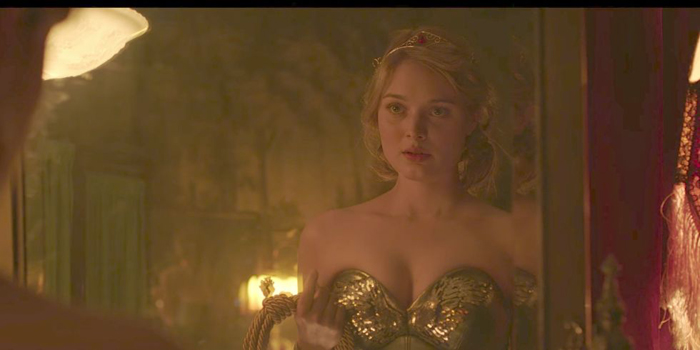Wonder Woman, one of the most prolific female superheros, only recently entered the Hollywood spotlight, from the smash hit Wonder Woman (2017), to her allegedly expanded role in the upcoming film Justice League (2017). Created in 1941, the character’s incredible origins, however, remained largely unknown.
Written and directed by Angela Robinson (The L Word, D.E.B.S.) Professor Marston and the Wonder Women centres on William Moulton Marston (Luke Evans), a psychology professor at Radcliffe College, and his wife Elizabeth (Rebecca Hall), an underappreciated psychologist who is bitter that Harvard denied her a PhD for her work. When the pair take on a new research assistant—a young psychology student named Olive Byrne (Bella Heathcote), the initial sexual tension and jealousy between them blossoms into romance, and the three characters begin a bisexual polyamorous relationship that changes their lives. Marston, inspired by his brilliant feminist partners and seeking to teach the world about his psychological theories, creates Wonder Woman—an allegory for the modern empowered woman, and a revolutionary superhero.
Robinson’s impressive writing and directorial talents are evident throughout the film, from clever humour and intriguing character dynamics, to the stunning cinematography and evocative lighting. When combined with the subtle soundtrack that carries the film like a fluttering heartbeat, the visual aspects of the film are subtle and grounded, yet they masterfully convey the characters’ emotions. While the Easter eggs will be more obvious to comic book readers or fans of the Lynda Carter TV show, Wonder Woman (1975-1979) fans will find a trove of references to the costume and origins of Diana Prince and Steve Trevor—whether it be Olive Byrne’s hairstyle and silver bracelets, or William Marston’s past as a spy in World War I.
At its core, the film is a biographical love story. Hollywood oftentimes presents unconventional relationships as fetishizing and degrading. In the hands of another director, Marston could have easily been presented as a manipulative, Hugh Hefner-like creep. However, the balance between Marston’s story and that of the two women ensures that the three characters are emotionally developed, and the relationship feels real.
Evans, Hall, and Heathcote portray their characters with passion and sincerity; their chemistry is intoxicating as their relationship develops. However, the standout performance of the film is easily Hall (The Prestige, Iron Man 3, Christine), who brings an incredible love, bitterness, and dry wit to Elizabeth Marston’s character. She carries the bulk of the film’s humour and emotional stakes, as she struggles with the legitimacy of their relationship and seeks to be accepted and respected by the world around her as a woman and intellectual.
Professor Marston and the Wonder Women is a subtly brilliant film that maintains its focus on the love between its three main characters, keeping the audience invested through the actors’ passionate performances and its meticulous writing and direction. With the recent release of Wonder Woman’s first blockbuster film, and the revelation of her bisexuality by Wonder Woman comic writer Greg Rucka, this is an important film for fans to see, as it shines a positive light on the unconventional lives of the professor who created her and the wonderful women who embodied her.








